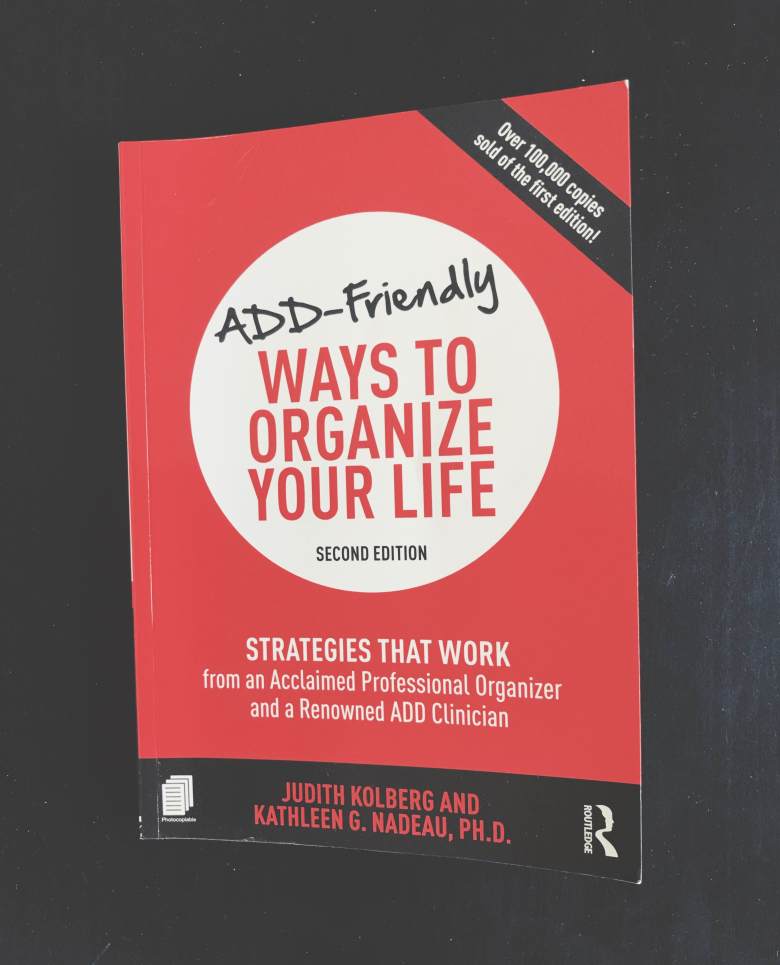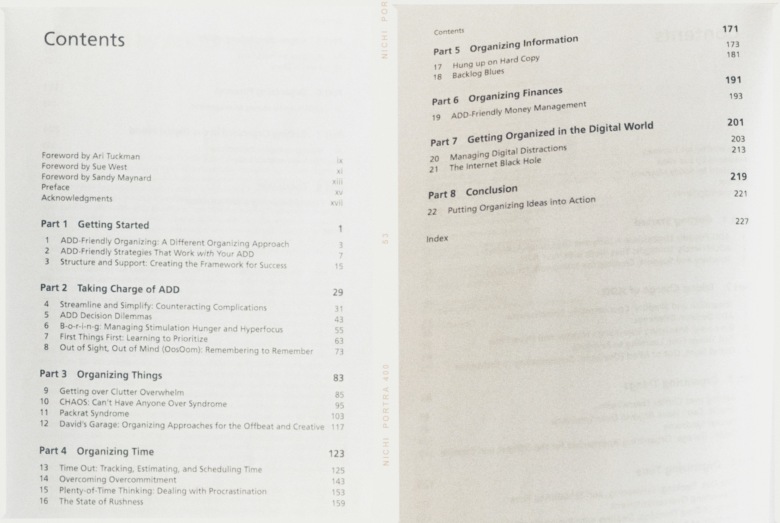
Without organizing strategies that work with your ADD, life is not what it can be, should be, or what you are capable of.
—Kolberg/Nadeau ADD-friendly Ways to Organize your Life
Dr. Kathleen Nadeau is an expert on ADD, and Judith Kolberg is an expert in organizing. Together, they created a safe haven for the chaotic ADHD mind in their book ADD-friendly Ways to Organize Your Life. According to them, “the keys to ADD-friendly organizing success involves strategies, support, and structure”. As someone blessed with an ADHD fuzzybrain, I sure as hell agree. It’s difficult to organize your ADHD life. A good strategy helps you in focusing, finding things, setting priorities, and getting stuff done. At least most of the time. If you’re lucky. And everything’s quiet. And there are no people around. And there’s no clutter lying around. And you just did some cardio. And…
“Don’t be so difficult!” ADHD and focus
Having a hard time focusing on something, let’s say because of a noisy colleague or some other nuisance, can happen to anyone. Most people will eventually get their stuff done, no matter what. My ADHD fuzzybrain, on the contrary, prefers to focus on the sound that distracts me and imagine different ways of destroying its source, no matter who or what it is. And that’s just one part of the problem — we haven’t yet touched on such sensitive topics as reaching decisions, finding things, bending time and space, and not going batshit crazy thanks to total digital information overload a.s.o.
Kathleen and Judith touch on every important subject and they do so in an ADHD-friendly way. You may read this book from cover to cover or you can simply jump back and forth according to your specific area of despair. In the end, people with ADHD share a diagnosis, but not necessarily similar symptoms and problems. Therefore, what is important to me might not be an issue for you and vice versa. Judith and Kathleen deal with lots of potential issues concerning fuzzybrains and share thorough insights and advice.
Let’s take a closer look at how you can organize your ADHD life, shall we?

Simplify everything to organize your ADHD life
In 8 parts and many chapters, the authors tackle various problem areas, which may be more or less interesting and important for you. I, for one, am doing okay on the mail, money, and organizing things front, so these parts and chapters were interesting, but less important for me. “Decision dilemmas” and “out of sight out of mind”, however, were chapters that were written for me (‘m sure of that).
But even before diving into various topics, the authors emphasize one basic maxim that also answers some of my questions:
Simplify, simplify, simplify. The more simple the task, the lower the demands on executive functioning skills. This should be the mantra for adults with ADD. Simplification is one of the strongest stress management and life management tools that an adult with ADD can learn. The more complex the task, the more overscheduled the day, the more chances there are for confusion, forgetfulness, and careless errors.
Some may recognize this immediately: simplification is indeed king. Before reading this book — and I read it in late 2018, so I had more than enough time to test some recommendations they give — I never realized just how important it is for me to simplify huge parts of my day. This starts with getting dressed: I’ve never been fashion-conscious or fancy, but today I focus on just a few colors — black, white, gray, and blue jeans — that work in pretty much every combination. This makes getting dressed much easier. I’m still working on the shoe and bag/backpack department, but I’m getting there. After all, I’m the queen of decluttering 🙂
Simplification keeps me sane in many more ways, especially regarding my daily planning — one notebook fits all my needs, and bullet journaling keeps me organized — but also when it comes to working. I always structure and plan my projects on my own no matter if at work or regarding my academic endeavors. I have a hard time working with others’ systems because they often seem unnecessarily complicated to me. I’m much faster following my own rules, even if it means redoing or rewriting something. I know I can be peculiar, but it’s just the way I roll.
Following your own plan is also something the authors recommend. A fuzzy ADHD brain needs different ways of handling things, so if you find something ADHD-friendly that works for you, stick to it. I’ve ignored this for years and it didn’t serve me well. Once I accepted my fuzzybrain I realized that since I don’t take any medication, I was in dire need of some ADD-friendly coping strategies. Since then, I saw a vast increase in my productivity and my general well-being.
Finally, simplifying my home — by decluttering and keeping it tidy — makes staying sane and organized even easier. So, in my case, this key element of coping and living with ADD is very important. I guess this will be the case with most of us; if you are not sure, try it. Find one area you want to work on, reduce, or simplify — be it cooking, clothing, your daily planner, or one room in your apartment/house — and just go for it. After a few weeks, you will feel a difference, and I hope it’s a positive one 🙂
But not all is sunshine and rainbows in my ADHD fuzzybrain, and there are still a few areas I need to improve. Thankfully, Judith and Kathleen got me covered — as long as I remember to check in with them regularly…
ADHD and this thing they call ‘memory’
Ask me what I did yesterday and it will take me some time to remember — provided that I remember what day it was, where I am, and who you are. I don’t remember names, news, things people tell me, and who told me something. I’m mainly visually oriented, so I can remember faces, places, things I see, and the information I read, but I will have a hard time remembering what someone TOLD me.
Welcome to my fuzzybrain, it might seem familiar to some of you. Considering all this, it seems logical that I have a huge OosOom (“Out of sight, out of mind”) issue. If I don’t leave my keys in the lock, I will forget to take them with me. If I don’t pack everything I need the night before, I will leave half of my stuff behind the next morning. If I want to write a review for my blog but put the book somewhere on a shelf, I will write about something else or forget about it altogether.
As the authors state:
One of the typical symptoms of ADD is forgetfulness, another term for poor working memory. You need good working memory to remember to drop off the dry cleaning and put gas in the car on your way to work. People with poor working memory may remind themselves of these tasks as they head out the door, but 20 minutes later they find that they have driven right past the dry cleaners and the gas station without stopping because their minds are on something else.
One important reason for increasing forgetfulness and working memory overload is your stress level. Therefore, Judith and Kathleen recommend lowering our stress levels, which will have a direct impact on ADHD symptoms, like forgetfulness. Of course, they’re right — I guess we all know that in times of heightened stress, our fuzzybrains refuse to cooperate properly, stressing us even more. Thus, where I can control it, I try to keep my stress levels to a minimum.
But sometimes it’s simply not possible to avoid stress altogether and we still have to work properly. Judith and Kathleen share various additional tips, like keeping daily bold and bright to-do lists that include only the things we absolutely need to do, or creating a “take-me-with-you” basket next to your door to put your keys, wallet, and everything you should not forget when leaving the house into. And these are just some things I remembered — you will find even more suggestions in their book 🙂
One way this book improved my workflow regarding OosOom is their storage solution for paper documents. I have tons of research papers, summaries, and articles printed out to read for my dissertation. For a long time, I stored them in stacks, as most of us do. However, when the authors pointed out that “horizontal hides; vertical reveals”, I switched to a vertical storage solution for all my printed documents and it made my PhD life ten thousand times easier…!
Regarding time management, they recommend using analog watches, something I agree with. Since I stopped using my phone as a watch and switched to a simple analog wristwatch, I have a better feeling for time, how much I have left until the full hour, or how late it truly is. Time is no longer just some abstract digital number I somehow can’t translate to grasp the meaning. Keeping one eye on your analog watch or using a Pomodoro app can be helpful while working on something important for a certain time interval.
Comprehensive, clear, and useful guide to organizing your ADHD-brain
While reading this book, you recognize that Kathleen is an ADHD clinician, which obviously adds to a thorough overview of countless strategies you can employ to support and empower your fuzzybrain. Throughout their book, the authors regularly include ways in which family, friends, and professionals can support you on your way to organize your ADHD life, be it as “clutter companions” or “time tutors”. To make it more engaging for fuzzybrain readers, they feature list after list and still a few more lists as well as recaps and overviews that make it easy for anyone to stay focused and filter important information.
This is just one of several ADHD-friendly organizing guides I read, and I plan to review several others as well. I’m often sceptical regarding self-help guides because more often than not they propose that their way is the ONLY way to do or handle something, and that’s simply not true. But with most (though not all) of these ADHD books, I’m glad I read them because I always found some new information or insight into my story.
I hope it will do the same for you if you want to try it.
See you soon, take care and stay healthy. 🙂
